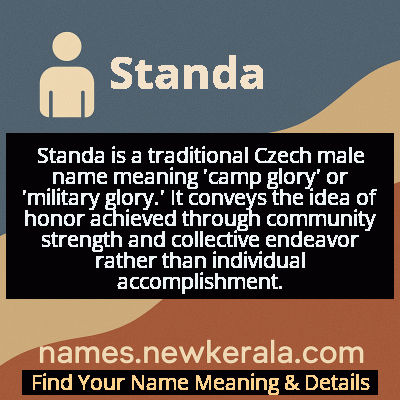Standa Name Meaning & Details
Origin, Popularity, Numerology Analysis & Name Meaning of Standa
Discover the origin, meaning, and cultural significance of the name STANDA. Delve into its historical roots and explore the lasting impact it has had on communities and traditions.
Name
Standa
Gender
Male
Origin
Czechoslovakian
Lucky Number
5
Meaning of the Name - Standa
Standa is a traditional Czech male name meaning 'camp glory' or 'military glory.' It conveys the idea of honor achieved through community strength and collective endeavor rather than individual accomplishment.
Standa - Complete Numerology Analysis
Your Numerology Number
Based on Pythagorean Numerology System
Ruling Planet
Mercury
Positive Nature
Adventurous, dynamic, curious, and social.
Negative Traits
Restless, impatient, inconsistent, prone to indulgence.
Lucky Colours
Green, white.
Lucky Days
Wednesday.
Lucky Stones
Emerald.
Harmony Numbers
1, 3, 9.
Best Suited Professions
Sales, marketing, travel, entertainment.
What People Like About You
Versatility, charisma, adventurous spirit.
Famous People Named Standa
Standa Zindulka
Actor
Prominent Czech actor known for roles in Czech films and television series
Standa Procházka
Ice Hockey Player
Czechoslovak ice hockey defenseman who played internationally
Standa Bartoš
Musician
Czech folk singer and guitarist, member of the band Spirituál kvintet
Standa Křeček
Politician
Czech politician and former Ombudsman of the Czech Republic
Name Variations & International Equivalents
Click on blue names to explore their detailed meanings. Gray names with will be available soon.
Cultural & Historical Significance
Extended Personality Analysis
Individuals named Standa are typically characterized by their grounded nature, reliability, and understated strength. They embody the Czech cultural ideal of quiet competence - people who get things done without seeking attention or praise. Standas are often perceived as family-oriented traditionalists who value stability and continuity, showing deep loyalty to their loved ones and communities. Their personality reflects practical wisdom and emotional resilience, with a tendency to approach challenges methodically rather than impulsively. While they may appear reserved in social situations, this often masks a dry wit and keen observational skills that emerge among trusted companions. Standas typically prefer substance over style, valuing genuine relationships and meaningful work over superficial achievements. Their strength lies in their consistency and dependability, making them the rocks upon which others lean during difficult times. This personality archetype represents the cultural appreciation for those who build and maintain rather than those who merely dazzle and move on.
Modern Usage & Popularity
In contemporary usage, Standa has transitioned from being a popular given name to primarily serving as a familiar diminutive for Stanislav, though it retains strong cultural recognition in Czech and Slovak communities. The name peaked in popularity during the mid-20th century and has gradually declined since the 1990s, now being perceived as somewhat dated among younger generations. However, it maintains nostalgic appeal and is experiencing a modest revival as part of the broader trend toward traditional Czech names. Current usage patterns show Standa more commonly as a nickname or among older generations, while formal registrations of the name itself have become rare. The name's association with reliability and traditional values continues to give it warm connotations, even as its practical usage evolves. In diaspora communities, Standa often serves as a cultural marker connecting younger generations to their Czechoslovak heritage.
Symbolic & Spiritual Meanings
Symbolically, Standa represents the enduring strength found in community and tradition. The name evokes the image of a military camp not as a place of conflict, but as a symbol of protection, organization, and collective purpose - where individual contributions create something greater than themselves. The 'glory' aspect symbolizes achievements earned through steadfast service rather than dramatic conquests, reflecting the value of consistent reliability over flashy accomplishments. Metaphorically, Standa embodies the foundation upon which societies are built - the quiet, essential supports that enable communities to thrive. It represents the Czech cultural principle that true honor comes from faithful service to one's family and community, finding greatness in ordinary dedication rather than extraordinary fame. The name also carries connotations of roots and stability, symbolizing connection to heritage and the transmission of values across generations.

